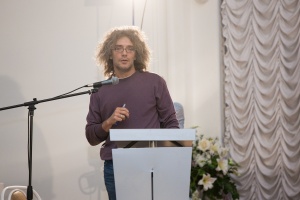
Ebola virus particles. Colorized scanning electron micrograph of filamentous Ebola virus particles budding from a chronically infected VERO E6 cell (35,000x magnification). Photo courtesy of NIAID, Flickr
With West Africa reeling from the deadliest-ever Ebola outbreak, cases reported in Western Europe, and American aid workers infected the nasty virus seems on the cusp of becoming a horrifying global phenomenon. Media hype and panic mongering aside, what about some sober, scientific facts about a seemingly incurable disease? Could it be compared to the Spanish flu pandemic which wiped out five percent of the global population a century ago? We have asked Skoltech biomedicine experts to assess the situation. Here is what Professor Konstantin Severinov and doctoral researcher Anna Pavlova had to say about the outbreak that has taken the lives of more than a thousand people this year.
Q: The Ebola virus has been around for a long time. What makes this particular string particularly aggressive? Is it easier to contract or does it wreak its damage on the body more effectively?
Konstantin Severinov: “We actually do not know for how many years have Ebola been around. However, it is true that it has been endemic in certain African countries, with cases reported every year. It has been also known to affect ape populations there. In fact people who get infected often get the virus though consumption of bush meat.
“The current outbreak is unusual because of its scale. To tie the larger number of observed cases with some specific changes in the virus, one would need to perform analysis of genomes of viruses isolated from present-day victims and older isolates, for example those that are stored in several high security labs in the US and Russia. This is almost certainly being done now, but the results are not known yet, so no conclusions can be made.”

Anna Pavlova worked as a doctor before joining Skoltech: “The problem with Ebola is that it is hard and often impossible to stop the bleeding”
Anna Pavlova: “One of the top five most dangerous pathogens in the World, Ebola kills up to 90 per cent of infected humans. There is no treatment and no vaccine. The virus evades the immune system by inhibiting the early steps of activation of a type of white blood cells called neutrophil. The white blood cells serve as carriers to transport the virus throughout the entire body to places such as lymph nodes, liver, lungs, and spleen. The sad result of the infection bleeding from and into the skin, vomiting and coughing blood, or passing it urine and stool. In general, bleeding symptoms often indicate the worst prognosis. Patients ultimately die from a combination of dehydration, massive bleeding, and shock.
Q: Should people brace themselves for a world epidemic? Is this the perfect virus tsunami? Or just media hyped panic?
KS: “This virus is transmitted only upon exchange of bodily fluids (i.e., blood). In the absence of natural reservoir, which is probably some species of African bats, it cannot spread efficiently between humans particularly in countries with modern standards of medical practice. So this is a cause for concern and more research, but certainly not panic.”
AP: “At the Center of Hematology where I have worked as a doctor, I’ve witnessed firsthand the efforts to treat a lot of patients with acute leukemia who were dying of hemorrhagic syndrome. It is hard and often impossible to stop bleeding when the hemostatic system is unbalanced, decompensated and exhausted. And this is the main cause of this awful human mortality rate from Ebola.”
Q: One of World War I’s enduring and menacing legacies is the Spanish flu. Despite much talk about SARS, Marburg and other deadly viruses humanity seems to have been spared something similar in magnitude over the past hundred years. Why? Might things be different now?
KS: “Humanity is not really “spared” from the flu virus which infects humans globally on a yearly basis, mostly during cold season. The “success” (from the virus point of view) of that virus was due to several mutations that made it highly infectious. With time, the nastiness of a parasite, a virus or bacteria, tends to decrease and it is better tolerated by the host. This is due to changes both in the parasite and its host that allow for more mild interaction. So the humankind may not encounter such a hugely successful flu virus as was the Spanish flu.”
Q: Have you seen the 1990’s blockbuster film ‘outbreak’ featuring Dustin Hoffman as a fearless and selfless researcher? \
KS: Yep.
Q: Should we all stock up on biohazard suits like in that movie?
KS: “Definitely not. Certainly not in Moscow.”
* The Skolkovo Institute of Science and Technology (Skoltech) is a private graduate research university in Skolkovo, Russia, a suburb of Moscow. Established in 2011 in collaboration with MIT, Skoltech educates global leaders in innovation, advances scientific knowledge, and fosters new technologies to address critical issues facing Russia and the world. Applying international research and educational models, the university integrates the best Russian scientific traditions with twenty-first century entrepreneurship and innovation.
